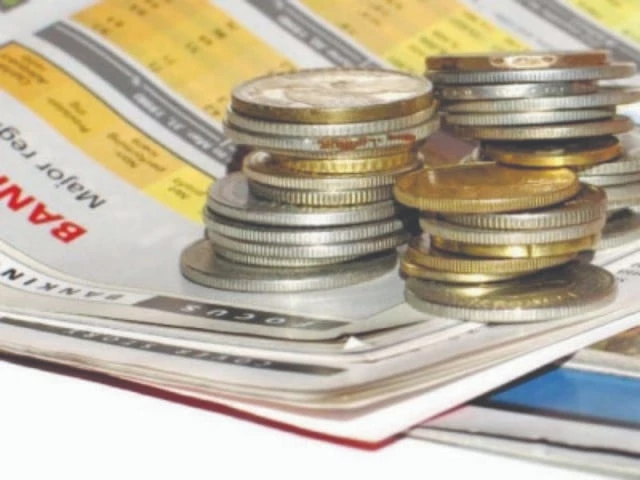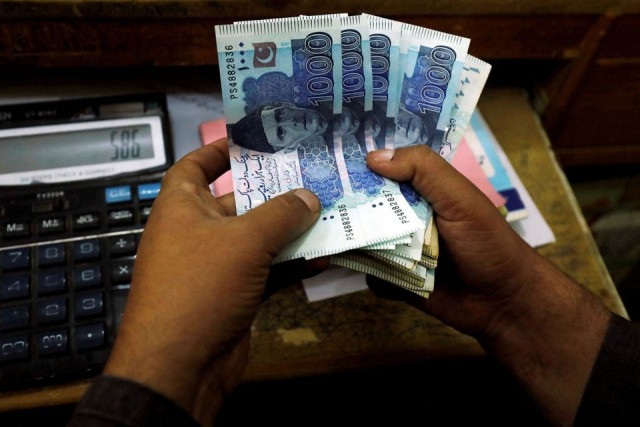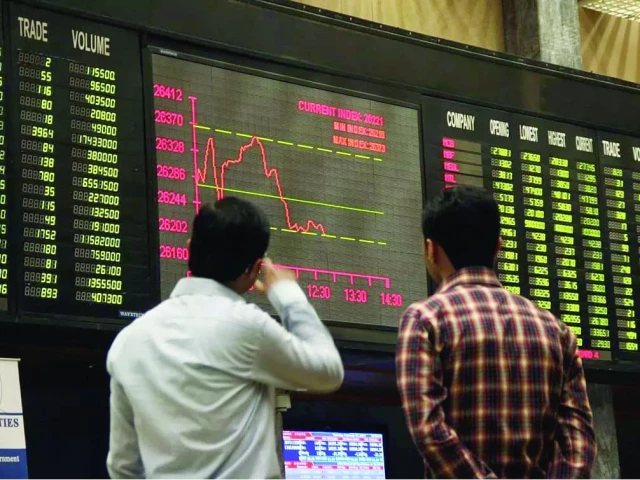Business
New funds to bridge $15b gap | The Express Tribune

KARACHI:
The Securities and Exchange Commission of Pakistan (SECP) has launched a new category of mutual funds titled Infrastructure Schemes under the framework of open-end collective investment schemes, in a bid to mobilise long-term domestic savings for infrastructure development.
The initiative, identified as a key milestone under the Fund Management Department’s Roadmap 2025-26, was first discussed at the Mutual Fund Focus Group Session earlier this year. Following extensive consultations with the Mutual Funds Association of Pakistan (MUFAP) and other stakeholders, SECP finalised a framework aimed at regulatory clarity, investor protection, and alignment with national development priorities.
Pakistan requires nearly $15 billion annually to meet its infrastructure financing needs, but current spending stands at only 2.1% of GDP, far below the international benchmark of 8-10%. By carving out a dedicated regulatory category, SECP hopes to provide greater visibility to infrastructure-focused funds and give investors structured access to projects of national importance.
“SECP’s introduction of a dedicated framework for Infrastructure Mutual Funds marks a transformative step for Pakistan’s capital markets and economy,” said Deputy Head of Trading at Arif Habib Ltd, Ali Najib.
For PSX and its investors, this development creates new investment avenues, particularly in long-term infrastructure sectors like energy, transport, housing, and healthcare, enhancing portfolio diversification and stability, he noted. Institutional and retail investors gain structured, transparent access to projects of national importance, potentially boosting liquidity and market depth.
For the common person, the framework indirectly benefits society by channelling savings into infrastructure development, leading to job creation, improved services, and better living standards while promoting sustainable economic growth, Najib added.
Under the new regulations, Asset Management Companies (AMCs) can classify infrastructure schemes as equity, debt, or hybrid funds. Investment opportunities cover a wide spectrum, including energy, transport, logistics, water, sanitation, communications, and social infrastructure such as hospitals, schools, industrial parks, affordable housing, and tourism facilities.
To boost investor confidence, minimum fund sizes have been set at Rs100 million for perpetual schemes. AMCs must also invest at least Rs25 million as seed capital in closed-end schemes exceeding three years’ maturity, ensuring manager-investor alignment. Such schemes may allow periodic subscriptions and redemptions after one year, with conditions clearly defined in offering documents.
The framework provides flexibility on Net Asset Value (NAV) disclosures, requiring updates at intervals not exceeding one month. Additionally, schemes must maintain at least 70% of net assets in infrastructure securities, with any shortfall to be regularised within three months.
Management fees have been capped at 3% for equity schemes and 1.5% for debt schemes, with hybrid funds following a weighted average formula. Sales loads are prohibited, though contingent loads may apply for early redemptions in closed-end schemes.
Maaz Azam, Research Head at Optimus Capital Management, termed the framework an “alternative investment avenue” that could strengthen transparency and accountability in infrastructure projects. He observed that corruption and poor quality often mar public projects, but a regulated fund structure could enforce higher standards and return-oriented practices. “This is a good step,” Azam said. “It gives investors exposure to a new asset class, while the country benefits from long-term infrastructure development.”
The SECP initiative is seen as part of broader efforts to expand the role of capital markets in Pakistan’s economic development. By bridging the infrastructure financing gap, the regulator aims to attract both domestic and international investors while reinforcing confidence in the fund management industry.
Business
Serial rail fare evader faces jail over 112 unpaid tickets

One of Britain’s most prolific rail fare dodgers could face jail after admitting dozens of travel offences.
Charles Brohiri, 29, pleaded guilty to travelling without buying a ticket a total of 112 times over a two-year period, Westminster Magistrates’ Court heard.
He could be ordered to pay more than £18,000 in unpaid fares and legal costs, the court was told.
He will be sentenced next month.
District Judge Nina Tempia warned Brohiri “could face a custodial sentence because of the number of offences he has committed”.
He pleaded guilty to 76 offences on Thursday.
It came after he was convicted in his absence of 36 charges at a previous hearing.
During Thursday’s hearing, Judge Tempia dismissed a bid by Brohiri’s lawyers to have the 36 convictions overturned.
They had argued the prosecutions were unlawful because they had not been brought by a qualified legal professional.
But Judge Tempia rejected the argument, saying there had been “no abuse of this court’s process”.
Business
John Swinney under fire over ‘smallest tax cut in history’ after Scottish Budget

John Swinney has been pressed over whether this week’s Scottish Budget gives some workers the “smallest tax cut in history” – with Tory leader Russell Findlay branding the reduction “miserly” and “insulting”.
The Scottish Conservative leader challenged the First Minister after Tuesday’s Holyrood Budget effectively cut taxes for lower earners, by increasing the threshold for the basic and intermediate bands of income tax.
But Mr Findlay said that would leave workers at most £31.75 a year better off – saying this amounts to a saving of just £61p a week
“That wouldn’t even buy you a bag of peanuts,” the Scottish Tory leader said.
“John Swinney’s Budget might even have broken a world record, because a Scottish Government tax adviser says it ‘maybe the smallest tax cut in history’.”
Raising the “miserly cut” at First Minister’s Questions in the Scottish Parliament, Mr Findlay demanded to know if the SNP leader believed his “insulting tax cut will actually help Scotland’s struggling households”.
The attack came as the Tory accused the SNP government of increasing taxes on higher earners, with its freeze on higher income tax thresholds, which will pull more Scots into these brackets.
This is needed to pay for the “SNP’s out of control, unaffordable benefits bill”, the Conservative added.
Mr Findlay said: “The Scottish Conservatives will not back and cannot back a Budget that does nothing to help Scotland’s workers and businesses.
“It hammers people with higher taxes to fund a bloated benefits system.”
Hitting out at Labour – whose leader Anas Sarwar has already declared they will not block the government’s Budget – Mr Findlay said: “It is absolutely mind-blowing that Labour and other so-called opposition parties will let this SNP boorach of a budget pass.
“Don’t the people of Scotland deserve lower taxes, fairer benefits and a government focused on economic growth?”
Mr Swinney said the Budget “delivers on the priorities of the people of Scotland” by “strengthening our National Health Service and supporting people and businesses with the challenges of the cost of living”.
He insisted income tax decisions in the Budget would mean that in 2026-27 “55% of Scottish taxpayers are now expected to pay less income tax than if they lived in England”.
The First Minister went on to say that showed “the people of Scotland have a Government that is on their side”.
Referring to polls putting his party on course to win the Holyrood elections in May, the SNP leader added that “all the current indications show the people of Scotland want to have this Government here for the long term”.
Benefits funding is “keeping children out of poverty”, he told MSPs, adding the Budget contained a “range of measures” that would build on existing support.
The First Minister said: “What that is a demonstration of is a Government that is on the side of the people of Scotland and I am proud of the measures we set out in the Budget on Tuesday.”
Meanwhile he said the Tories wanted to make tax cuts that would cost £1 billion, with “not a scrap of detail about how that would be delivered”.
With the weekly leaders’ question time clash coming less than 48 hours after the draft 2026-27 Budget was unveiled, the First Minister also faced questions from Scottish Labour’s Anas Sarwar, who insisted that the proposals “lacks ambition for Scotland”.
Pressing his SNP rival, the Scottish Labour leader said: “While he brags about his £6 a year tax cut for the lowest paid, one million Scots including nurses, teachers and police officers face being forced to pay more.
“Even his own tax adviser says this is a political stunt. So why does John Swinney believe that someone earning £33,500 has the broadest shoulders and therefore should pay more tax in Scotland?”
Mr Swinney, however, said that many public sector workers would be better off in Scotland.
He told the Scottish Labour leader: “A band six nurse at the bottom of the scale will take home an additional £1,994 after tax compared to the same band in England.
“A qualified teacher at the bottom of the band will take home £6,365 more after tax in Scotland than the equivalent in England. There are the facts for Mr Sarwar.”
Business
BP cautions over ‘weak’ oil trading and reveals up to £3.7bn in write-downs

BP has warned it expects to book up to five billion dollars (£3.7 billion) in write-downs across its gas and low-carbon energy division as it also said oil trading had been weak in its final quarter.
The oil giant joined FTSE 100 rival Shell, after it also last week cautioned over a weaker performance from trading, which comes amid a drop in the cost of crude.
BP said Brent crude prices averaged 63.73 dollars per barrel in the fourth quarter of last year compared with 69.13 dollars a barrel in the previous three months.
Oil prices have slumped in recent weeks, partly driven lower due to US President Donald Trump’s move to oust and detain Venezuela’s leader and lay claim to crude in the region, leading to fears of a supply glut.
In its update ahead of full-year results, BP also said it expects to book a four billion dollar (£3 billion) to five billion dollar (£3.7 billion) impairment in its so-called transition businesses, largely relating to its gas and low-carbon energy division.
But it said further progress had been made in slashing debts, with its net debt falling to between 22 billion and 23 billion dollars (£16.4 billion to £17.1 billion) at the end of 2025, down from 26.1 billion dollars (£19.4 billion) at the end of September.
It comes after the firm’s surprise move last month to appoint Woodside Energy boss Meg O’Neill as its new chief executive as Murray Auchincloss stepped down after less than two years in the role.
Ms O’Neill will start in the role on April 1, with Carol Howle, current executive vice president of supply, trading and shipping at BP, acting as chief executive on an interim basis until the new boss joins.
Ms O’Neill’s appointment has made history as she will become the first woman to run BP – and also the first to head up a top five global oil company – as well as being the first ever outsider to take on the post at BP.
Shares in BP fell 1% in morning trading on Wednesday after the latest update.
-

 Politics1 week ago
Politics1 week agoUK says provided assistance in US-led tanker seizure
-

 Entertainment1 week ago
Entertainment1 week agoDoes new US food pyramid put too much steak on your plate?
-

 Entertainment1 week ago
Entertainment1 week agoWhy did Nick Reiner’s lawyer Alan Jackson withdraw from case?
-

 Business1 week ago
Business1 week agoTrump moves to ban home purchases by institutional investors
-

 Sports5 days ago
Sports5 days agoClock is ticking for Frank at Spurs, with dwindling evidence he deserves extra time
-

 Sports1 week ago
Sports1 week agoPGA of America CEO steps down after one year to take care of mother and mother-in-law
-

 Business1 week ago
Business1 week agoBulls dominate as KSE-100 breaks past 186,000 mark – SUCH TV
-

 Business1 week ago
Business1 week agoGold prices declined in the local market – SUCH TV












